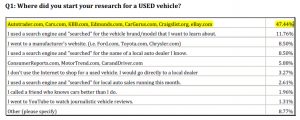Ed - Here is my first thought...I don't buy 4x the number of people START at AT.com, cars.com et. al. before searching "used toyota camry" in Google. It's counter intuitive. I'm much more likely to believe they made the above search and their first click was an aggregator. Do we believe all those aggregators combined have stronger branding than Google?
1. Do you actually believe those statistics?
2. Have you ever seen any other research to support that claim...or anything close to it? (BTW a cars.com rep saying that 100% of in-market shoppers will visit their website, does not count...((Yes, that really happened.))
I'm not saying it's impossible, just improbable. It's pretty far from what I would consider to be normal shopping behavior.
@Gayle Rogers - A quick story before I dig in -- on my first day at AutoTrader in 2000, I was sitting next to a a guy named Bill in the orientation session. Bill was wearing a button down shirt over a tie-dye t shirt, so I thought to myself, "dotcoms are strange". An hour or so into the session, the trainer introduced the CFO. Wouldn't you know it -- it was the dude in the tie-dye. Bill stood up and explained that he was spending tens of millions of dollars to establish a brand. He fully intended to lose 100 million that year.
I tell the story to show that, while the 'big two' 3rd party sites don't necessarily have stronger branding than Google, they are nonetheless are pretty strong brand presences. We see well over half of our traffic typing our URL directly into the toolbar and while I don't have the current data from ATC, I suspect it's pretty similar.
Now, the biggest point; In many other verticals, "normal shopping behavior" most certainly includes well-branded, highly specialized, marketplaces and specialized search engines.
For
Travel you have Expedia, Travelocity, etc.
For
Jobs you have Monster, Indeed, etc.
For
Real Estate you have Zillow, Trulia, etc.
And really for most shopping items I, like millions of others, go directly to
Amazon. For example I just bought
PetSafe Drinkwell Platinum Pet Fountain to keep my cat healthy and happy when I'm away. I searched, read the reviews, compared products and pricing -- all within Amazon. No Google needed. I also bought a tie rack, a couple of t shirts, a half dozen phone charger cables, and some shoe polish; all within the past 30 days.
Google is one tool used by car shoppers, it is not the only one. For many car shoppers, I think going directly to the well-branded, specialized "Automotive Marketplace" search engines
is 'normal shopping behavior'.









